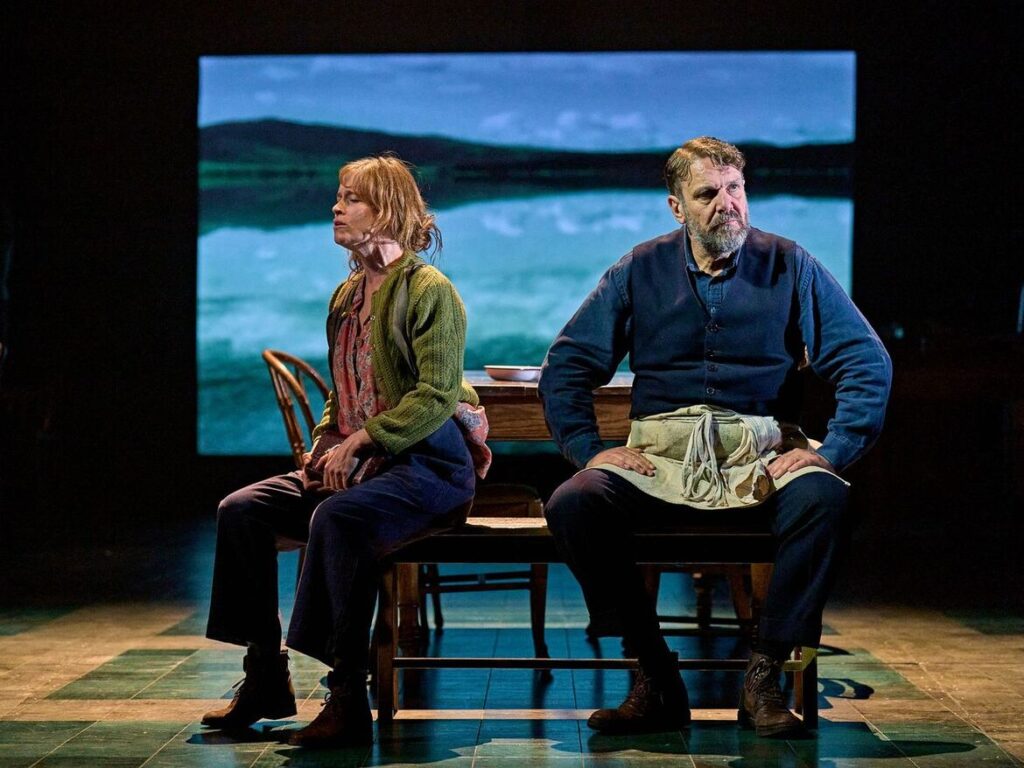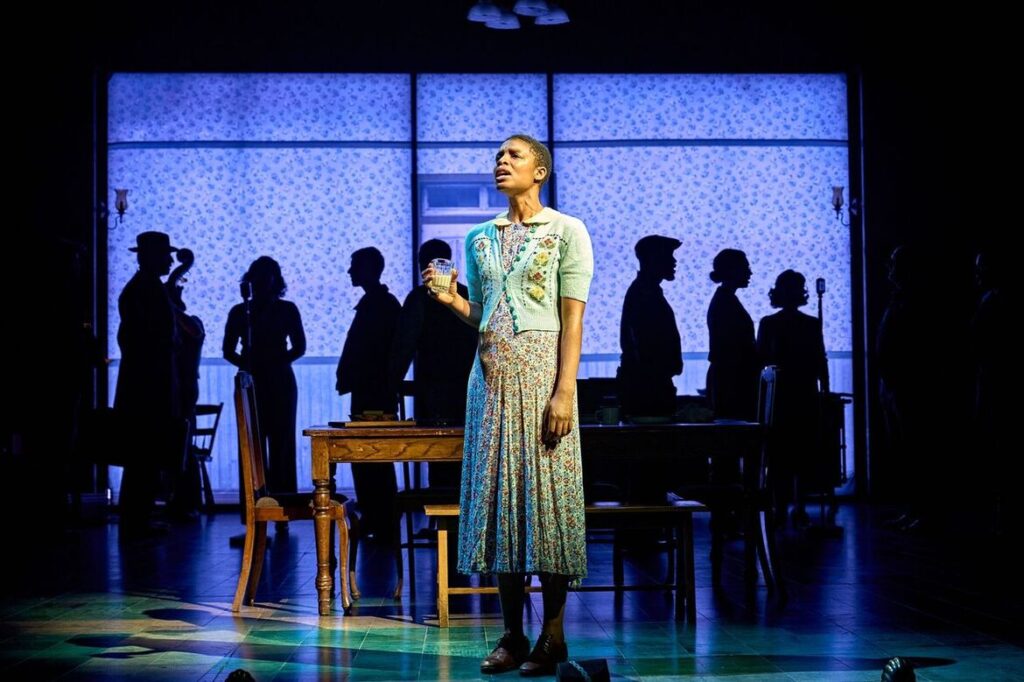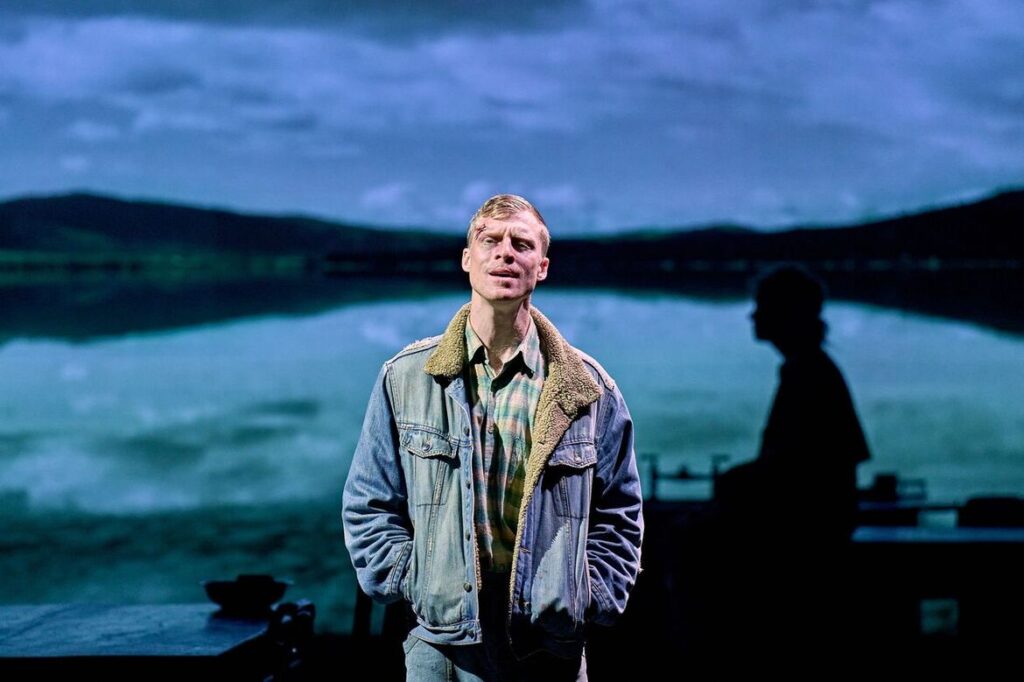Review by Simon Jenner, July 9 2025
After its resounding 2017 premiere and subsequent Broadway and West End acclaim, Conor McPherson’s Girl from the North Country with music by Bob Dylan returns to the Old Vic, again directed by McPherson till August 23rd. With every character singing, with many solos, some cast members (as well as band) playing instruments, and all inhabiting dust-bowl dreams, the sheer punch of talent doesn’t come much greater than this.


Katie Brayben and Colin Connor. Photo Credit: Manuel Harlan
It’s late November 1934 in Duluth, Minnesota – Dylan’s birthplace. George (Chris McHallem, also known as Dr Walker) performs the function of the more omniscient narrator in Thornton Wilder’s Our Town, or the recessed Alfieri in A View From the Bridge. His narrational voice isn’t as insistent as Wilder’s though a touch more would have been welcome.
So though there’s standout performances, it’s the ensemble sense of Wilder’s communally-oriented play from 1937 that suffuses McPherson’s retro invocation of just such community theatre out of the New Deal. That and a knowing dash of Steinbeck in this 23-strong company, as well as traces of that haunted stasis you find in Eugene O’Neill, whom McPherson references.
The relatively thin plot is studded with Simon Hale’s arrangements of Dylan’s songs making strange and idiomatic to this work all the evolving language of his lyricism. The band’s led by Alan Berry with movement by Lucy Hind so seamless it seems like dream instinct, as if the cast move by feel and stop up short to wake into hope, tragedy or resolve.
Weary, prematurely haggard Nick Laine (Colin Connor) is about to be foreclosed on: his attempts to keep open a revolving-door boarding-house and not overcharge nor be taken for a sucker is undermined by his unpredictable generosity. His flailing love tries taking care of his now-mentally-distressed wife Elizabeth (Katie Brayben) whose own performance electrifies the stage: Elizabeth seems in a semi-comatose state, when her drift sparks into devastating clarity.
Laine’s also trying to fix up their adopted Black daughter Marianne (Justina Kehinde, making Marianne absorbingly her own person) who’s pregnant, unmarried, refuses to name her passing lover. She won’t choose Teddy Kempner’s comedic Mr Perry, prophet-bearded and pushing seventy, pushed on her by Nick. Shades of Fiddler on the Roof here. Kehinde’s “Tight Connection to my Heart” nails Marianne’s fiercely private world.

Justina Kehinde. Photo Credit: Manuel Harlan
Two arrivals though shift that. Sifiso Mazibuko’s Joe Scott, released from a penitentiary for a crime he didn’t commit, arrives with a bible seller-cum-preacher Reverend Marlowe (Eugene McCoy) with his dodgy offers. There’s a tied history but Joe releases different emotions from the wary Marianne and the Laines’ son Gene (Colin Bates): a wannabe short-story writer he unaccountably takes against Joe in a racist moment Joe puts down. It’s not explored. Whisky? Gene though in a small plot has already lost Katherine Draper (Lydia White) who believes in his writing. She’s settled for security. Their duet “I Want You” is heartrending; you want something to happen here.
It’s Brayben’s performances though that persuades us we’re experiencing more than Depression chic. Her “Like a Rolling Stone” is extraordinary. Her rendition can’t be an imitation and she rephrases “how does it feel”. So many idiomatic inflections that raise goosebumps in Dylan’s own renditions (indeed in that very rolling vocal in “like a rolling stone”) are melodically flattened in this work; most songs lose a tiny bit of that thrill. But in place there’s a blazing characterising, a cut-through blowtorch ferocity, particularly in Brayben, that sets these arrangements apart from any cover version.
Brayben in particular sashays from apparent near-dementia and assaults with a knife, to unnerving clarity, where like a prophet she sees every detail around her and pronounces. Elizabeth is already semaphoring from the abyss.
“Is Your Love in Vain” duetted by Mr and Mrs Burke (opportunistic but not unsympathetic David Ganly and glamorous-but-realistic Rebecca Thornhill respectively) is moulded by the fate of their afflicted son Elias (Steffan Harri). His own arc seems subsumed in the clutter of communal meals and awkwardness. He finally gets his fine solo in “Duquesne Whistle” which fits his far-away moment, though fails to illumine his inner state.
Brayben burns “Forever Young” like an outsider on a life long past, as the penultimate number. Mazibuko’s vocals are superbly burnished in several songs and just when you think it’s over, Maria Omakinwa (as suave, attractive Mrs Neilson, attached to Nick, but independent) leads a hymn-like performance of the final number, “Pressing On”. She also suddenly traces Debussy’s ‘Clair de Lune’ on the onstage upright piano.
Rae Smith’s set (and costumes of brown dazzled by shafts of red and white visitants) deploys an uncluttered stage and backdrops of boarding house, lake under a wan white winter sky, suffusing the onset of snow. It’s lit moodily by Mark Henderson who brings a huggy warmth to interiors, sometimes a chiaroscuro of almost sacramental proportions to the Thanksgiving. Most striking though is his silhouetting figures at key points against a stark off-white backdrop. It emphasises a people on the move: transitional, transient, haunted by hunger, shafts of hope and withered dreams.
There’s superb ensemble work from fight captain Daniel Bailey, Frankie Hart, Ryan Heenan, Graham Kent, dance captain Nichola MacEvilly and David Tarkenter.
Girl from the North Country freights a world in a steam whistle. Its impact still has everyone on their feet after an overwhelming musical experience. It’s not flawless: there’s necessary under-development of 13 main characters in a work already running (here) for two hours 35. It’s already been revised – in 2022. Nevertheless, a little more narration, a few words between, might shift a slight undernourishment. Occasionally the plot hangs as gaunt yet baggy as the characters’ dreams. Dramatically though you’re still asking what life, rather than McPherson, will do with them. That means eight years on, Girl from the North Country must still be lived through: especially if you feel the times are changing dangerously back again.
Musicians Alan Berry (Musical Director, Piano/Harmonium), Charlie Brown (Violin/Mandolin), Tom Coppin (Lap Resonator, Acoustic & Nylon Steel Guitars), Don Richardson (Double Bass), Gareth Ellis (Cover Conductor).
Movement & Intimacy Lucy Hind, Casting Jessica Ronane CDG, Voice and Dialect Salvatore Sorce, Dialect, Fights Brett Yount
Associate Director Corey McMahon, Associate Costume Poppy Hall, Associate Sound Jay Jones, Associate Movement James Berkery, Musicians’ Contractor David Gallagher, Bayliss Assistant Director
Hair, Wigs & Make-Up Supervisor Campbell Young Associates, Additional Arrangements Music Associate Conor McPherson, Simon Hale
CSM Tamsin Withers, DSM Sophie Rubenstein, ASM Emily Lawes
Colin Bates. Photo by Manuel Harlan



